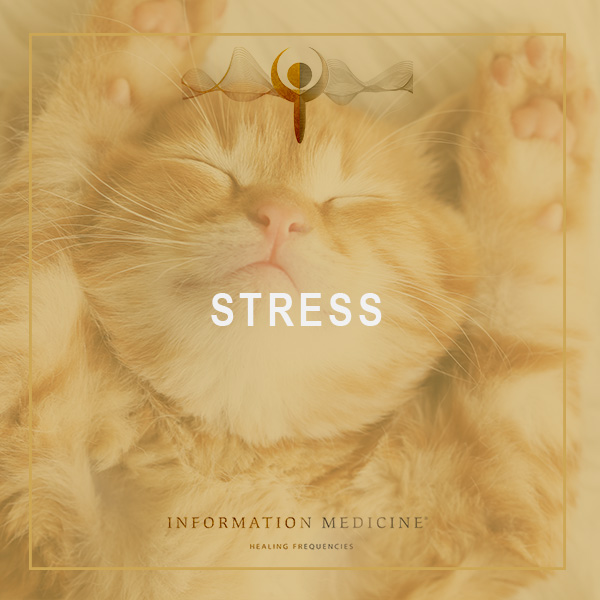This sound file is very suitable when you can use some extra support in times of tension and stress. It contains the balancing frequencies that can help to relieve both physical and emotional stress and to be relaxed and resilient in life.
Stress is a form of tension that occurs in the body of people, animals or plants in response to external stimuli. This tension ensures that the body is ready for action and performance.
We experience positive stress, for example, when we are preparing for a competition. The body is then in a state of higher alertness and concentration. This form of stress is short-lived and the body quickly and easily returns to a state of rest. We speak of negative stress if the stress is not in the interest of humans or animals and is experienced as a negative event.
Situations that jeopardize the basic needs of safety, health, love and social bonding can cause stress in both humans and animals. Love is of course a typical human concept, but it is clear that animals also have certain preferences/friendships. Think, for example, of the bond between a mother animal and her young. The response to stress is physiologically an emergency response for the body. The animal’s body is put into a higher state of alert in order to react quickly, it is a flight or fight response.
There are two types of stress reactions, fast and slow. The fast stress response is mediated by the sympathetic nervous system, releasing adrenaline and noradrenaline from the adrenal medulla. Adrenaline prepares the body for fight or flight. The heart rate and breathing rate increase, the pupils dilate, and the blood supply shifts from the intestines to the muscles.
The slow reaction goes through the HPA axis (the hypothalamus-pituitary-adrenal axis), this is a cascade reaction that causes the adrenal glands to release the hormone cortisol (corticosteroid). This hormone ensures that sufficient energy is released to respond quickly to the stress stimulus and it also has an inhibiting effect on the stress response. With prolonged stress, cortisol levels and sugar levels in the blood become elevated for too long. The adrenal glands become exhausted. Cortisol, a corticosteroid, has an inhibitory effect on the immune system and so it becomes weakened. The microbiome can be disrupted and stomach ulcers can develop (horses are especially sensitive to this). Nerve damage can also occur. The high blood sugar levels cause a disruption in the metabolism, resulting in an increased risk of, among other things, tying-up, cramped muscles, incorrect storage of fats and laminitis.
If too much tension is present in the long term, stress can lead to physical and psychological complaints. Animals can get all kinds of behavioral problems that can lead to unwanted behavior. It can also manifest itself in physical complaints such as itching, skin irritation and a reduced immune system, making them susceptible to all kinds of other conditions.
Other symptoms of stress include: increased heart rate, rapid and shallow breathing, trembling, visible whites of the eyes, cramped muscles, shortened walking, flapping of the lips, stereo typical behaviour such as crib biting, air sucking and weaving, grinding of teeth, frequent yawning, shutting oneself off from the environment, aggressive behavior, easily irritated, pulled up nose / lips, nervousness, snoring or blowing in horses, dogs that bark excessively, lose weight despite a good appetite, continue to lick / groom themselves, cats peeing next to the litter box, displacement activity, reduced immune system, yeast infections and other parasitic infections, frequent small urination, loose and watery stools, itching/scratching, and much more.
NB! Sometimes signals can be very subtle, especially with introvert animals!
Causes of stress in dogs and cats can be, for example, too little freedom, fear of abandonment and other fears, pain, changes such as a move or renovation, noise, travelling, loss of a buddy or owner or the wrong buddy or owner and certainly also the emotions of owners. Therefore, do not underestimate the need to discharge for animals that are used as service animals or coaching animals.
In horses, the same causes as mentioned above can cause stress. There is only one big difference with dogs and cats and that is that a horse is a prey animal and we humans are predators. Therefore, you need to make sure that you have a good relationship of trust with the horse and that you handle the horse in peace. In addition, in many cases we want to ride a horse and we do that partly at the height of a place, the withers, where a predator would attack a horse in the wild. In addition, horses cannot see us when we are on their backs or standing behind them.
All of this brings with it a huge responsibility for us humans in the way we treat animals.
This sound file can be combined well with sound files such as Grounding & Relaxation, Alignment, Protection, Inner balance, Trauma emotional – PTSD or Addiction – Stereotyped behavior.
In horses with a stomach ulcer, this sound file can be combined well with the sound files Trauma emotional – PTSD, Regeneration and Stomach or Digestion & metabolism.
